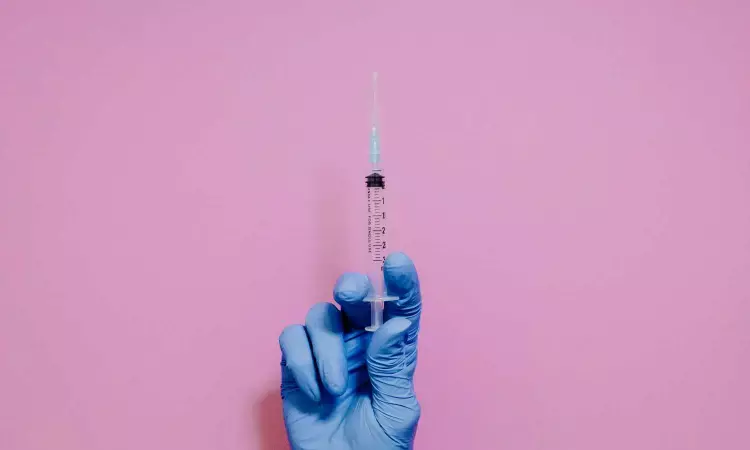- Home
- Medical news & Guidelines
- Anesthesiology
- Cardiology and CTVS
- Critical Care
- Dentistry
- Dermatology
- Diabetes and Endocrinology
- ENT
- Gastroenterology
- Medicine
- Nephrology
- Neurology
- Obstretics-Gynaecology
- Oncology
- Ophthalmology
- Orthopaedics
- Pediatrics-Neonatology
- Psychiatry
- Pulmonology
- Radiology
- Surgery
- Urology
- Laboratory Medicine
- Diet
- Nursing
- Paramedical
- Physiotherapy
- Health news
- Fact Check
- Bone Health Fact Check
- Brain Health Fact Check
- Cancer Related Fact Check
- Child Care Fact Check
- Dental and oral health fact check
- Diabetes and metabolic health fact check
- Diet and Nutrition Fact Check
- Eye and ENT Care Fact Check
- Fitness fact check
- Gut health fact check
- Heart health fact check
- Kidney health fact check
- Medical education fact check
- Men's health fact check
- Respiratory fact check
- Skin and hair care fact check
- Vaccine and Immunization fact check
- Women's health fact check
- AYUSH
- State News
- Andaman and Nicobar Islands
- Andhra Pradesh
- Arunachal Pradesh
- Assam
- Bihar
- Chandigarh
- Chattisgarh
- Dadra and Nagar Haveli
- Daman and Diu
- Delhi
- Goa
- Gujarat
- Haryana
- Himachal Pradesh
- Jammu & Kashmir
- Jharkhand
- Karnataka
- Kerala
- Ladakh
- Lakshadweep
- Madhya Pradesh
- Maharashtra
- Manipur
- Meghalaya
- Mizoram
- Nagaland
- Odisha
- Puducherry
- Punjab
- Rajasthan
- Sikkim
- Tamil Nadu
- Telangana
- Tripura
- Uttar Pradesh
- Uttrakhand
- West Bengal
- Medical Education
- Industry
Injection Tirzepatide may help treat Congenital Generalized Lipodystrophy: Case Report

Congenital generalized lipodystrophy (CGL) is a rare autosomal recessive disorder characterized by a near-total absence of adipose tissue from birth. This deficiency leads to extreme insulin resistance, resulting in diabetes.
Rutgers Health researchers have found that a weekly injection of diabetes medication could replace painful daily hormone shots for people with a rare genetic form of lipodystrophy that leaves patients with almost zero fat tissue, according to a study in The New England Journal of Medicine.
Congenital generalized lipodystrophy (CGL), which affects only a few thousand people worldwide, results in severe metabolic disease, diabetes, insulin resistance and reduced life expectancy. With no fat tissue for proper storage, fat accumulates in organs such as the liver, leading to extreme insulin resistance and diabetes.
"These patients are severely ill and face markedly reduced life expectancy due to profound insulin resistance," said Christoph Buettner, chief of endocrinology, metabolism, and nutrition at Rutgers Robert Wood Johnson Medical School and senior author of the study.
Currently, the standard treatment for CGL involves daily injections of metreleptin, a synthetic version of the hormone leptin, which is naturally produced exclusively by fat tissue. However, daily leptin shots are both expensive -- costing hundreds of thousands of dollars annually -- and particularly painful for CGL patients.
"When you inject yourself with, for example, insulin, you inject into subcutaneous fat, but these patients don't have that," said Svetlana Ten, associate professor of pediatrics and first author of the study. "Each injection is painful."
In the recent study, researchers explored if the diabetes and obesity drug tirzepatide(the active ingredient in Zepbound and Mounjaro) could improve CGL, as it improves insulin resistance. Tirzepatide is administered through a weekly injection, potentially reducing the burden and pain associated with CGL treatment. It is also much more affordable than metreleptin.
The first patient, a 23-year-old man who had refused the painful daily treatments with leptin and insulin for 2 years, saw his average blood glucose drop from 252 to 128 milligrams per deciliter after three weeks on the maximum dose of tirzepatide. His blood glucose, which had been at healthy levels between 70 and 140 milligrams per deciliter in 8% of readings, remained at healthy levels in 93% of readings, an almost complete normalization without the need to inject insulin.
The second patient, a 64-year-old woman who required supplemental insulin injections because leptin alone couldn't control her blood glucose, achieved normal blood glucose levels with tirzepatide alone.
"The surprise here was that when we stopped leptin and gave tirzepatide, the patient was very well controlled, probably better than while she was taking leptin," Buettner said. "Leptin is an important hormone, made only by fat tissue, that is an important regulator of metabolism, so leptin therapy made intuitive sense in patients with CGL. The hormone GLP1, which is mimicked by tirzepatide, is not made in adipose tissue, and while tirzepatide is an insulin sensitizer, we did not expect it would have such potency in patients with CGL."
While both tirzepatide and leptin work in the brain, they do so through different signaling pathways, acting on different neurons in distinct brain regions. This suggests that leptin and GLP1 signaling may have more extensive overlap than so far suggested.
The researchers plan a larger trial to validate these initial results, though recruiting enough patients will be challenging given the condition's rarity.
If the results hold up in larger studies, tirzepatide could offer CGL patients an easier and potentially more affordable treatment option. However, Buettner said more research is needed to evaluate both the long-term efficacy and safety in this specific patient population and beyond that in other leptin-deficient conditions.
Reference:
Svetlana Ten, Amrit Bhangoo, Christoph Buettner. Tirzepatide for Congenital Generalized Lipodystrophy. New England Journal of Medicine, 2025; DOI: 10.1056/NEJMc2413871
Dr Kamal Kant Kohli-MBBS, DTCD- a chest specialist with more than 30 years of practice and a flair for writing clinical articles, Dr Kamal Kant Kohli joined Medical Dialogues as a Chief Editor of Medical News. Besides writing articles, as an editor, he proofreads and verifies all the medical content published on Medical Dialogues including those coming from journals, studies,medical conferences,guidelines etc. Email: drkohli@medicaldialogues.in. Contact no. 011-43720751


